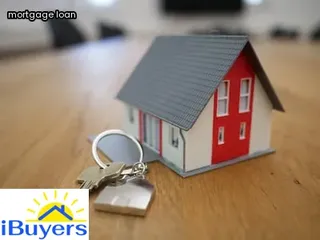Home equity loans are a popular way to finance home improvement projects but they may not be the best option for everyone. An alternative to this type of loan is to use other forms of financing such as a personal loan or cash-out refinance.
Personal loans allow you to borrow money without having to use your home as collateral, and cash-out refinances can provide you with a lump sum of money that can be used for any purpose. However, both options come with their own set of risks and should be carefully considered before making a decision.
It is also important to consider other factors such as interest rates, repayment terms, and potential tax implications when exploring different financing options for home improvement projects. Ultimately, the best choice depends on your individual financial situation and goals.

Cash-out refinancing can be a great option for homeowners looking to make improvements to their home, but it's important to understand the advantages and disadvantages of this strategy. One major advantage is that you are able to obtain a new, lower interest rate on your mortgage loan.
Additionally, if you have already built up equity in your home, you could potentially get a larger loan amount than you would with a home equity loan or line of credit. This allows you to reduce what you owe overall while obtaining the funds needed for the home improvement project.
On the other hand, cash-out refinancing requires closing costs and fees which can add up quickly so it's important to take these into account when considering whether this approach is right for you. Furthermore, if your credit score has dropped since purchasing your home, you may not qualify for the best rates and terms available with a cash-out refinance.
Finally, if the value of your home has decreased since purchasing it, then it may be difficult or impossible to get approved for this type of loan. Taking all these factors into consideration can help homeowners decide whether cash-out refinancing is a viable option for them when exploring alternatives to home equity loans for making improvements to their property.
When it comes to home improvement, home equity loans are a popular option for financing the project. However, there are other solutions available that may be more suitable depending on a homeowner's specific needs and financial situation.
Traditional home equity loans involve borrowing money from a lender against the value of your home as collateral. The interest rate is usually low and offers tax deductions for the amount borrowed.
Non-traditional alternatives are also available that provide flexibility and convenience but may have higher interest rates than traditional loans. These options include taking out a personal loan, leveraging credit cards, or tapping into cash reserves such as retirement funds or investments.
Each of these alternatives has its own advantages and disadvantages, so it's important to consider all possible solutions before making a decision. Consider factors like repayment terms, fees, and interest rates when comparing traditional and non-traditional home equity solutions to determine which option is right for your particular needs.

Strategizing how to maximize the benefits of home equity loan alternatives is an important step in exploring options for financing home improvement projects. One strategy is to shop around and compare different lenders, as each lender may offer different terms, interest rates, and repayment plans.
A second strategy is to consider government-backed loan programs that offer lower interest rates or longer repayment terms. Additionally, it is important to understand the differences between secured and unsecured loans in order to choose the best option for an individual’s needs.
For example, secured loans typically require borrowers to put up collateral and come with lower interest rates than unsecured loans, which offer more flexibility but tend to come with higher interest rates. Finally, researching grants and tax credits can help reduce the overall cost of a home improvement project by providing additional funding opportunities.
Understanding these strategies can help individuals make informed decisions when looking into alternative financing options for their home improvement projects.
When it comes to home improvement projects, many homeowners often turn to home equity loans as a way to finance the work. However, there are other options available that may be more financially beneficial for homeowners when deciding how to fund their project.
A personal loan may be an attractive option for those who do not have much equity built up in their homes or who cannot qualify for a traditional loan. Personal loans can provide homeowners with access to funds quickly and without the need for collateral.
When considering whether a personal loan is right for you, it's important to consider all of your options and determine which will best meet your financial needs while allowing you to complete the desired home improvements. Consider factors such as the terms of repayment, interest rates, fees, and any additional benefits that come with the loan before making a decision.
Be sure to compare different lenders in order to find the most competitive offers and find the best option for your budget. With careful research and comparison shopping, you can find an affordable personal loan that meets your needs and helps you make improvements on your home.

Home sale leasebacks provide homeowners with an alternative to home equity loans when they are looking to finance their home improvement projects. A home sale leaseback can be a great option for those who are unable to access or secure financing from a traditional lender but still need access to capital.
Homeowners can receive the cash upfront and pay it back over time, allowing for more flexibility than a loan and avoiding the need for high interest rates. Additionally, some of the tax benefits associated with owning a rental property may apply, making this an attractive option for those looking to add value to their homes.
With a home sale leaseback, homeowners can purchase and renovate the property without taking on the burden of additional debt. It's important to weigh out all the pros and cons of this method before deciding if it is right for you, as there may be restrictions on what type of improvements you are allowed to make while leasing your own home.
Exploring home equity sharing agreements as an option is a great way to get the financing needed for home improvement projects without taking out a loan. Home equity sharing allows homeowners to partner with an investor who supplies the funds necessary for the project in exchange for a share of the future increase in property value.
This type of agreement can be beneficial because it allows homeowners to keep more of their equity, while still getting access to capital. Additionally, since there is no loan involved, there are no interest payments or fees associated with the arrangement.
Homeowners and investors should both be aware that this type of agreement is not without risk, however. It is important to thoroughly research all aspects of any home equity sharing agreement before entering into one.

A cash-out refinance is a type of mortgage loan that enables homeowners to access the equity in their property for financing needs. It allows them to borrow more than what they owe on their original loan and receive the difference in cash.
There are many advantages to this type of financing option, including lower interest rates, no closing costs, and tax deductions. Additionally, a cash-out refinance can be used for home improvement projects, debt consolidation, and other financial needs.
The terms of the loan will vary based on the borrower’s credit score and the current market value of their home. Homeowners should carefully consider all options before deciding which one is best for them.
When it comes to home improvement projects, many homeowners turn to home equity loans as a source of financing. However, with the current economic climate, these types of loans may not always be available or may not provide the best terms.
Therefore, it is important for homeowners to explore other options to fund their projects. One such option is utilizing credit cards.
Evaluating your credit card options can be a great way to finance home improvements and renovations. Credit cards often offer perks like reward points or cash back bonuses that can help offset some of the cost of your project.
Additionally, there may be promotional offers available with certain cards that could provide a 0% introductory rate for a set period of time. It's important to read all the fine print associated with any card offers and make sure you understand the fees and interest rates associated with them before making any decisions.
Comparing various offers from different issuers can help you determine which option is best for your needs so you can make an informed decision about how to fund your home improvement projects.

When considering home improvement financing options, it’s important to assess all available options, including manufacturer and dealer financing. Many manufacturers and dealers offer attractive financing opportunities to purchase and install home improvement products such as appliances, furniture, and electronics.
These options often come with special terms such as no interest for an extended period of time or deferred payments. Additionally, some retailers may provide additional incentives such as discounts or free delivery with the purchase.
Manufacturer and dealer financing can be a great way to get the product you need without having to take out a home equity loan. It is important to compare all offers carefully and read any fine print before committing to a financing agreement.
Be sure to do your research on the company offering the financing option in order to ensure they are legitimate and their products are of good quality. Finally, it’s important to understand all of the terms associated with the agreement before signing anything so that you can make an informed decision about which option is best for your needs.
Investigating the benefits of a home equity investment plan involves exploring various options that can help finance home improvement projects without relying on a traditional loan. In addition to traditional loans, there are other methods for financing home improvements such as using cash savings, setting up payment plans with vendors, or taking out a personal loan.
Home equity investment plans are another alternative for homeowners who want to invest in their property but have limited resources or limited access to other forms of capital. These plans allow homeowners to borrow against their existing equity and invest the funds in their homes, while still making payments on the loan.
By investing in home improvements with a home equity investment plan, homeowners can potentially increase their property value while saving money on interest payments over time. Additionally, it may be possible to leverage existing assets within an existing portfolio to cover the costs associated with investing in a home equity plan.
Investigating all available options is essential when considering ways to fund a home improvement project and ensure that the most cost-effective solution is pursued.

When looking for student loan options, it is important to be aware of potential scams. One of the most common types of scams surrounding student loans is the promise of an unrealistic interest rate or loan forgiveness program.
It is also important to be aware of any fees or additional costs associated with the loan, as well as any hidden terms and conditions that could potentially affect your ability to pay back the loan. Additionally, make sure you are dealing with a legitimate lender who has shown evidence of proper licensing and registration.
Finally, before signing any documents or providing any personal information, contact the Better Business Bureau and read reviews from past customers in order to confirm that you are making a safe decision.
If you are looking to fund a home improvement project and want to explore options beyond a traditional Home Equity Loan, it is important to strategize ways to qualify for one despite any existing mortgage obligations. A home equity loan can be a great option for homeowners who want to access the equity built up in their homes, but there are some criteria that must be met before approval is granted.
Before applying for a loan, homeowners should assess their financial situation and calculate the total amount of debt they owe on all mortgages. Knowing your credit score and understanding how much you can afford in additional payments each month is also important.
With this information in hand, you will be able to research lenders who offer the best rates and terms for your particular situation. Additionally, it may be beneficial to speak with an experienced loan officer and discuss alternative repayment plans or other options that may help you meet qualifying guidelines.
With careful consideration of these factors, homeowners can determine if securing a home equity loan is the best move for them when financing home improvements.

Traditional loan products are often the go-to option for financing home improvements. These loan products, such as Home Equity Loans (HELs), offer a secure way to borrow against the equity in your home.
While HELs can be beneficial, it is important to carefully consider the pros and cons of this type of loan before signing on the dotted line. On one hand, HELs have lower interest rates than other types of loans and may provide tax benefits.
On the other hand, these loans typically come with high closing costs and long repayment terms. Additionally, if you are unable to make payments on time, you risk losing your home as collateral.
It is essential to weigh all these factors when exploring options for financing your home improvement projects and determine whether traditional loan products make sense for you financially.
When exploring options for financing home improvement projects, many homeowners often overlook unconventional sources of funding. However, there are several alternatives to a home equity loan that may be worth considering.
These include personal loans from banks and credit unions, credit cards with low interest rates or reward points, and even crowdfunding through online platforms such as Kickstarter or GoFundMe. Bank loans allow for more flexible repayment terms but generally require good credit scores, while credit cards offer shorter-term financing but can come with high interest rates.
Meanwhile, crowdfunding could provide a unique opportunity to share your project with the community and potentially raise necessary funds without taking on additional debt. While it’s important to do your research before committing to any financing option, these alternative strategies could provide an interesting option when seeking alternatives to a home equity loan.

When deciding how to finance a home improvement project, homeowners must weigh their short-term financing options against the long-term solutions available. Short-term financing includes taking out a loan or using a credit card, while long-term solutions involve saving up and paying for repairs out of pocket.
Home equity loans are one popular option for homeowners looking for funding, but there are alternatives to consider. For those seeking a quick fix with minimal interest paid over time, short-term financing may be the best route.
However, if the homeowner has the means to save up and pay for repairs in full immediately, this may be more cost effective in the long run due to avoiding interest payments altogether. Additionally, if the project will increase the value of your home in some way, it is wise to explore other methods such as grants and incentives offered by local organizations or government bodies.
Ultimately, each situation is different and homeowners should carefully consider all options before making any decisions.
One of the best ways to get equity out of your home without taking out a loan is to explore refinancing options. Refinancing your mortgage can help you access the equity in your home without taking on debt.
The process involves applying for a new mortgage that's larger than your existing loan and using the extra money to pay for home improvements or other expenses. Another option is to take out a cash-out refinance, which allows you to borrow up to 80% of the value of your home, minus any existing mortgages or liens.
This money can be used for any purpose, including making home improvements. Lastly, you can consider a reverse mortgage, which allows homeowners over the age of 62 to access their home's equity without having to make monthly payments.
All of these options provide different ways to tap into your home's equity without taking out a loan.

One of the most popular financing options for home improvement projects is a Home Equity Line of Credit (HELOC). However, many homeowners are now beginning to explore alternative solutions to the traditional HELOC.
One such option is a Cash-Out Refinance. A cash-out refinance allows you to borrow money against the existing equity in your home and use it for any purpose – including home repairs or renovations.
This type of loan typically offers a lower interest rate than a HELOC and may also provide additional tax benefits. Another alternative to a HELOC is a personal loan, which can offer longer repayment terms and less paperwork than some other types of loans.
Personal loans can be used for any purpose, including home improvements, but they may have higher interest rates than those associated with secured loans such as HELOCs. Finally, there are also government-sponsored loan programs available that help homeowners finance necessary repairs or renovations on their homes.
These types of loans typically feature low interest rates and long repayment terms, making them an ideal choice for many people looking for an alternative to a HELOC.
Taking equity out of your home without refinancing is possible with a Home Equity Line of Credit (HELOC). A HELOC allows you to borrow money against the equity in your home and access it when you need it.
Unlike refinancing, a HELOC does not require you to take out an entirely new loan. Instead, the lender approves you for an amount up to a certain limit and you can draw on that line of credit as needed.
This can be useful if you’re making relatively small improvements over time or need funds quickly since the approval process is much faster than refinancing. Additionally, interest rates on HELOCs are generally lower than those for home equity loans, making them a more economical choice for taking out equity from your home without refinancing.
When considering a home improvement loan, a home equity loan may be the first option you consider. While home equity loans often offer low interest rates and long repayment terms, it is important to understand that there are potential downsides to this type of financing.
One of the primary drawbacks of a home equity loan is that it is secured by the equity in your home, meaning that if you are unable to make payments on the loan, you could risk losing your home. Additionally, taking out a large amount of money in the form of a loan can have an adverse effect on your credit score if not properly managed.
Finally, since you are using your home as collateral for the loan, it is possible that funds released from the loan may be taxed as income. For these reasons and more, exploring other options before committing to a home equity loan should be strongly considered.